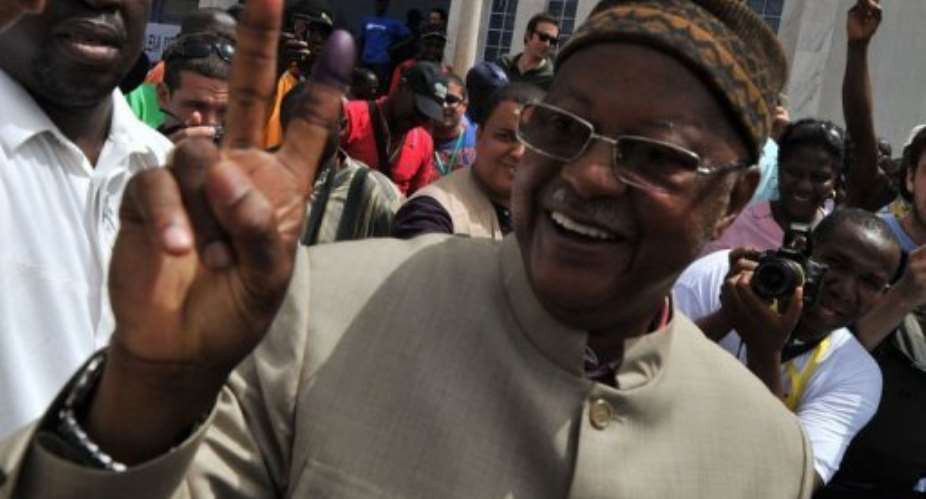BISSAU (AFP) - Guinea-Bissau's ex-prime minister Carlos Gomes dismissed claims of election fraud Wednesday as results showed he will face a run-off presidential vote in the coup-prone west African country.
Gomes, 62, narrowly missed a first round victory, scoring 48.97 percent in Sunday's election seen as a key test of the nation's commitment to stability after decades of coups and deadly score-settling between the army and state.
He needed an absolute majority of votes to prevent a second polling round in a country where chronic instability has allowed the cocaine trade to flourish.
Ex-president Kumba Yala should face Gomes in the runoff, having come second with 23.36 percent of the ballots cast Sunday, according to results announced by elections chief Desejado Lima de Costa.
But Yala on Tuesday led a call by five opposition candidates to have the poll annuled, saying it was riddled with fraud.
"Whoever publishes the results will be held responsible for what happens in this country," said Yala, who was ousted in 2003 following three years at the head of a regime plagued by instability.
He has not said whether he will contest the second voting round.
Gomes had stepped down as prime minister to contest the election. Yala retains strong support from his Balanta ethnic group, the country's largest.
Yala and the other opposition candidates said their fraud accusations centred on the use of sham voting registers and fake voters' cards, fictitious polling stations and multiple voting.
Gomes "condemns and categorically rejects" the allegations, his camp said in a statement on Wednesday.
The claims of rigging have stoked fears of further trouble in the coup-prone state after the assassination of former military intelligence chief Samba Diallo by men in military dress on Sunday.
"When five of nine candidates speak about a cancellation, there is a crisis," said political analyst Fafali Koudawo.
"It is normal that people are afraid, we know the chain of violence that happens here," he said, adding that people had little confidence in legal recourse.
Since winning independence through armed combat in 1974, Guinea-Bissau's army and state have remained in constant, often deadly conflict, with the result that no president has ever completed a full term in office.
Three have been overthrown in coups and one was assassinated in office in 2009.
Sunday's election was held after the last president, Malam Bacai Sanha, died in January following a long illness.
Observers from the African Union, Economic Community of West African States and Community of Portuguese-speaking Countries declared the poll had been "free, fair and transparent."
The AU did however note that the use of a 2008 voters register excluded those who reached voting age in the past four years.
Despite a peaceful day of voting, intelligence boss Diallo was shot dead hours later by men in military dress as he sat on the terrace of a restaurant near his home.
Diallo was director of military intelligence until April 2010, when he was arrested with other top officers on suspicion of involvement in a 2009 bombing that killed the then army chief and prompted the murder of president Joao Bernardo Vieira in a revenge attack a few hours later.
The military has denied involvement in the killing while the national elections commission has sought to distance the incident from the vote.
The country's international partners such as the United States and European Union are looking for signs of stability to reinstate vital support to security sector reform which was frozen after an army mutiny in 2010.





 Minority will expose the beneficial owners of SML, recover funds paid to company...
Minority will expose the beneficial owners of SML, recover funds paid to company...
 Prof. Opoku-Agyemang has ‘decapitated’ the NPP’s strategies; don’t take them ser...
Prof. Opoku-Agyemang has ‘decapitated’ the NPP’s strategies; don’t take them ser...
 Abubakar Tahiru: Ghanaian environmental activist sets world record by hugging 1,...
Abubakar Tahiru: Ghanaian environmental activist sets world record by hugging 1,...
 Prof. Naana Opoku-Agyemang will serve you with dignity, courage, and integrity a...
Prof. Naana Opoku-Agyemang will serve you with dignity, courage, and integrity a...
 Rectify salary anomalies to reduce tension and possible strike action in public ...
Rectify salary anomalies to reduce tension and possible strike action in public ...
 Stop all projects and fix ‘dumsor’ — Professor Charles Marfo to Akufo-Addo
Stop all projects and fix ‘dumsor’ — Professor Charles Marfo to Akufo-Addo
 Blue and white painted schools will attract dirt shortly – Kofi Asare
Blue and white painted schools will attract dirt shortly – Kofi Asare
 I endorse cost-sharing for free SHS, we should prioritise to know who can pay - ...
I endorse cost-sharing for free SHS, we should prioritise to know who can pay - ...
 See the four arsonists who petrol-bombed Labone-based CMG
See the four arsonists who petrol-bombed Labone-based CMG
 Mahama coming back because Akufo-Addo has failed, he hasn't performed more than ...
Mahama coming back because Akufo-Addo has failed, he hasn't performed more than ...
